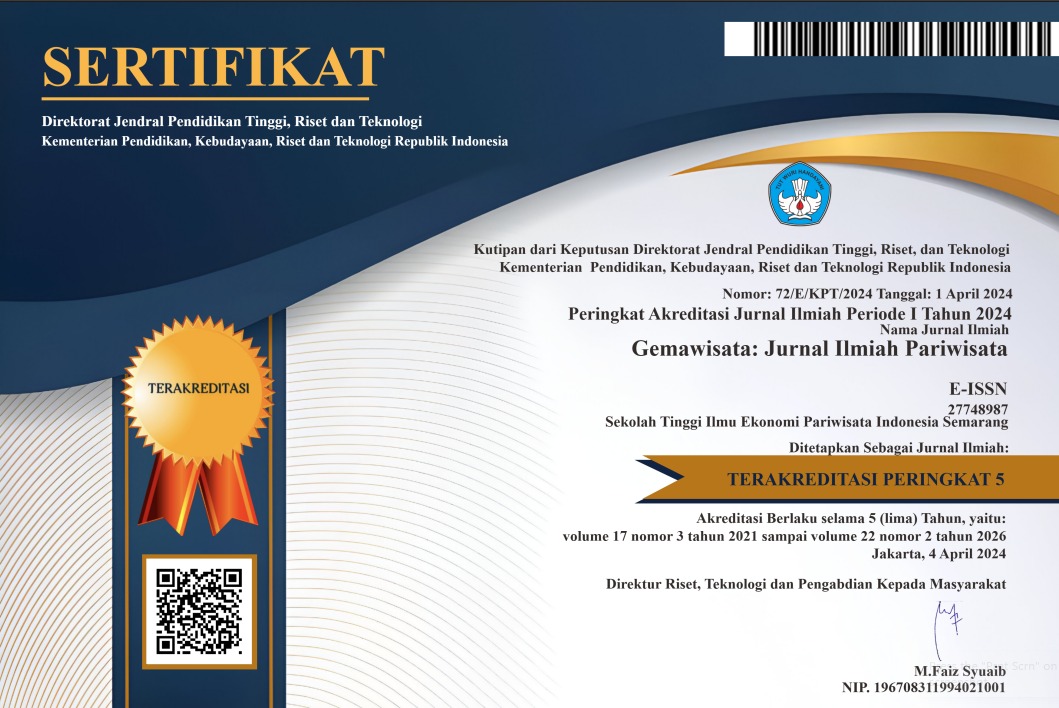Strategi Promosi Digital Partisipatif: Revitalisasi Branding Wisata Budaya Kampung Jawi Kota Semarang
DOI:
https://doi.org/10.56910/gemawisata.v21i3.849Keywords:
co-creation, community empowerment, digital promotion, participatory branding, rural tourismAbstract
Kampung Jawi, a cultural tourism destination in Semarang City, has experienced a significant decline in tourist visits due to stagnant digital promotion activities. The main problem lies in the absence of an integrative and empirically tested model that combines technology, community empowerment, and cultural reinforcement for Indonesian cultural tourism villages. This study aims to address this gap by formulating and testing the participatory SOME+ model, a modification of the original SOME framework (Share, Optimize, Manage, Engage) with the addition of TRAIN (capacity building) and SUSTAIN (sustainability). Using a mixed-methods exploratory sequential design (QUAL → quan), data were collected through observation, in-depth interviews, focus group discussions (FGDs), and social media content analysis. The findings highlight initial challenges such as low digital literacy and fragmented coordination. Nevertheless, a two-week pilot project increased social media engagement rates from 2.8% to 4.3% (a 52% rise) and enhanced community participation in content production from 25% to 41% (a 64% rise). The synthesis of these findings indicates that the SOME+ model effectively revitalizes the digital branding of cultural tourism villages. This research concludes that the participatory SOME+ model is a practical and replicable framework for strengthening community-based digital promotion and is recommended for adoption in rural tourism development policies.
References
Adie, B. A. (2020). Community-based tourism and over-tourism: Understanding resident perspectives. Journal of Sustainable Tourism, 28(12), 1994–2011. https://doi.org/10.1080/09669582.2020.1762643
Aditya, R., & Wardani, P. S. (2023). Digital co-creation in rural tourism: Empowering communities through social media engagement. Tourism Management Perspectives, 45, 101078. https://doi.org/10.1016/j.tmp.2023.101078
Adukaite, A., & Cantoni, L. (2022). Social media affordances in sustainable tourism: A systematic literature review. Journal of Cleaner Production, 356, 131789. https://doi.org/10.1016/j.jclepro.2022.131789
Confetto, M. G., Conte, F., Palazzo, M., & Siano, A. (2023). Digital destination branding: A framework to define and assess European DMOs practices. Journal of Destination Marketing & Management, 30, 100804. https://doi.org/10.1016/j.jdmm.2023.100804
Corbisiero, F., & La Rocca, R. A. (2023). Digital community-based tourism: A new paradigm for sustainable development. Sustainability, 15(4), 3452. https://doi.org/10.3390/su15043452
Creswell, J. W., & Plano Clark, V. L. (2018). Designing and conducting mixed methods research (3rd ed.). SAGE Publications.
Dwisatya, F., Raharjo, S. T., & Puspitasari, D. (2023). Instagram analytics for destination branding: Evidence from Indonesian cultural villages. Asia Pacific Journal of Tourism Research, 28(4), 355–370. https://doi.org/10.1080/10941665.2023.2196789
Gretzel, U., Fuchs, M., Baggio, R., Hoepken, W., Law, R., Neidhardt, J., Pesonen, J., Zanker, M., & Xiang, Z. (2020). e-Tourism beyond COVID-19: A call for transformative research. Information Technology & Tourism, 22, 187–203. https://doi.org/10.1007/s40558-020-00181-3
Hidayat, A., Novianti, S., & Utami, W. (2023). Sustainable digital tourism model: Integrating social capital and community participation. Jurnal Siasat Bisnis, 27(1), 1–15. https://doi.org/10.20885/jsb.vol27.iss1.art1
Ivankova, N. V., & Wingo, N. P. (2022). Applying mixed methods in community-based participatory research: A review of methodological practices. Health Education & Behavior, 49(1), 12–22. https://doi.org/10.1177/10901981211022358
Kapoor, A., Dwivedi, Y. K., Piercy, N. F., & Rana, N. P. (2021). Co-creation in digital platforms: A systematic review and research agenda. Journal of Business Research, 129, 473–487. https://doi.org/10.1016/j.jbusres.2021.03.034
Ketter, E. (2021). Instagram travel influencers in digital tourism placemaking: A new paradigm in travel marketing. Journal of Travel & Tourism Marketing, 38(9), 899–917. https://doi.org/10.1080/10548408.2021.1995586
Lo, Y.-C., & Janta, P. (2020). Residents' perspective on developing community-based tourism: A qualitative study of Muen Ngoen Kong Community, Chiang Mai, Thailand. Frontiers in Psychology, 11, 1493. https://doi.org/10.3389/fpsyg.2020.01493
Mínguez, C., & García-Hernández, M. (2023). Community-based tourism and local empowerment: Revisiting theoretical frameworks. Annals of Tourism Research, 94, 103430. https://doi.org/10.1016/j.annals.2022.103430
Müller, J., & Christandl, F. (2023). How to measure engagement in social media marketing: A literature review. Journal of Marketing Analytics, 11(1), 1–15. https://doi.org/10.1057/s41270-022-00165-8
Nugroho, A. D., Prasetyo, N., & Wibowo, A. (2022). Model pemberdayaan masyarakat berbasis digital untuk desa wisata di Indonesia: Systematic literature review. Jurnal IPTA, 10(1), 134–145. https://doi.org/10.24843/IPTA.2022.v10.i01.p14
Prabawani, B. (2023). Community-based innovation in tourism: Lessons from Indonesian rural destinations. Journal of Tourism Futures, 9(3), 289–303. https://doi.org/10.1108/JTF-05-2022-0103
Pramesti, I. G. A. A., & Suradnya, I. D. G. (2023). Digital co-creation in community-based tourism: A case study of Penglipuran Village, Bali. Journal of Destination Marketing & Management, 29, 100800. https://doi.org/10.1016/j.jdmm.2023.100800
Pramono, R., & Wulandari, D. (2021). Community-based tourism and social entrepreneurship: A model for sustainable tourism development. Jurnal Manajemen Teori dan Terapan, 14(3), 260–274. https://doi.org/10.20473/jmtt.v14i3.28745
Rasoolimanesh, S. M., Ramakrishna, S., Hall, C. M., Esfandiar, K., & Sharif, S. P. (2023). A systematic review of contextual marketing and sustainability in tourism. Journal of Sustainable Tourism, 31(5), 1129–1154. https://doi.org/10.1080/09669582.2021.1928140
Sigala, M. (2022). Digital transformation in tourism: A critical review. Tourism Management, 90, 104468. https://doi.org/10.1016/j.tourman.2022.104468
Tussyadiah, I. P., Jung, T. H., & tom Dieck, M. C. (2020). Enhancing tourism experience through mobile augmented reality: A design science approach. International Journal of Contemporary Hospitality Management, 32(11), 3505–3525. https://doi.org/10.1108/IJCHM-05-2020-0480
World Tourism Organization (UNWTO). (2020). COVID-19 and transforming tourism: Towards a digital and sustainable future. https://doi.org/10.18111/9789284422034
Yodsurang, P., & Lueangaramkul, A. (2022). Community-based tourism and heritage consumption in Thailand: A multi-level geospatial perspective. Cogent Arts & Humanities, 9(1), 2096531. https://doi.org/10.1080/23311886.2022.2096531
Zenker, S., & Braun, E. (2021). Place branding and citizen involvement: From marketing to co-creation? Place Branding and Public Diplomacy, 17(1), 1–9. https://doi.org/10.1057/s41254-020-00189-5
Zulu, J. M., Sandøy, I. F., Moland, K. M., Musonda, P., Munsaka, E., & Blystad, A. (2020). The challenge of using NVivo software in resource-constrained contexts: Lessons from a health-based study in Zambia. Global Health Action, 13(1), 1830453. https://doi.org/10.1080/16549716.2020.1830453


1_(1).jpg)






